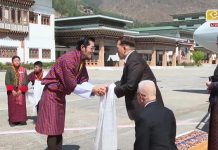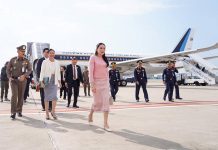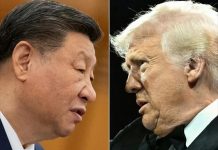BANGKOK (AP) — Thai authorities on Friday cast a wider net in the search for the perpetrators of the Aug. 17 bombing in Bangkok that killed 20 people, asking China to check whether a prime suspect had fled there.
Prime Minister Prayuth Chan-ocha said Friday that he did not know whether China would hand over the suspect if or when he was arrested. Police have suggested a man carrying a Chinese passport in the name Abudureheman Abudusataer may have directed the bombing of the Erawan Shrine.
The man, also known by the nickname Izan or Ishan, reportedly left Thailand on Aug. 16 for Bangladesh and then China.
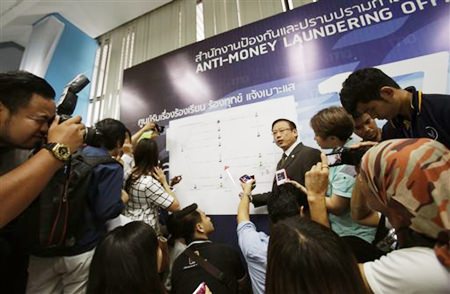 Thailand’s Anti-Money Laundering Office Secretary General Seehanart Prayoonrat, center right, displays a chart of money flows of people suspected of links to the Aug. 17 bombing. (AP Photo/Sakchai Lalit)
Thailand’s Anti-Money Laundering Office Secretary General Seehanart Prayoonrat, center right, displays a chart of money flows of people suspected of links to the Aug. 17 bombing. (AP Photo/Sakchai Lalit)
However, police spokesman Prawut Thavornsiri quoted Bangladesh’s ambassador as saying that the suspect left Bangladesh on Aug. 30 and was supposed to transit in Delhi on his way to China but never got to his final destination. The envoy, Saida Muna Tasneem, told police that the suspect obtained a visa for Bangladesh in Bangkok.
Prawut said Thai authorities contacted their Bangladeshi counterparts on Sept. 2, after the suspect left, but asked for information on his activities during his two weeks there. Nazrul Islam, a police spokesman in Dhaka, gave a different timetable for the events, saying that Thai police passed along their information only this past Thursday.
In Beijing, Foreign Ministry spokesman Hong Lei said China maintained close contacts with Thailand on the bombing investigation but gave no further detail.
Spokesmen for India’s External Affairs and Home ministries said they had no information about the suspect and had received no request for it from Thai authorities.
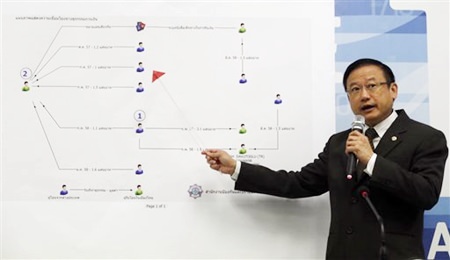 (AP Photo/Sakchai Lalit)
(AP Photo/Sakchai Lalit)
Prawut said police were checking whether other suspects, including perhaps the man who placed the bomb at the shrine, were trying to flee via Thailand’s southern border with Malaysia.
Arrest warrants seek about a dozen suspects in connection with the bombing, including several men carrying Turkish or Chinese passports, along with others whose nationalities are unknown. One Thai woman married to a Turkish man is also wanted.
Police believe the bomb was set off by members of a human-smuggling gang who sought revenge for a crackdown on their activities, but have not elaborated on the motive.
The alleged Turkish and Chinese links have fueled speculation that the bombing was to avenge Thailand’s forced repatriation of more than 100 ethnic Uighurs to China in July. Uighurs (pronounced WEE-gurs) are related to Turks, and Turkey is home to a large Uighur community.
The Erawan Shrine is especially popular with Chinese tourists, feeding the idea that it could be a target for people who believe the Uighurs are oppressed by China’s government.
Thai authorities also announced Friday they had traced the flow of money to several suspects and to people linked to them.
Seehanart Prayoonrat, secretary general of Thailand’s Anti-Money Laundering Office, said that money transfers had been traced that linked about 20 people together, more than the current number of suspects. He said the money came from two foreign countries, but declined to name them.
Acknowledging that some of the money could be for personal use, he said his agency had evidence that some of it had been used to buy materials used in the bombing, mostly at electricity shops.
AP writers Julhas Alam in Dhaka, Bangladesh, Didi Tang in Beijing and Ashok Sharma in New Delhi contributed to this report.
Copyright 2015 The Associated Press. All rights reserved. This material may not be published, broadcast, rewritten or redistributed.


